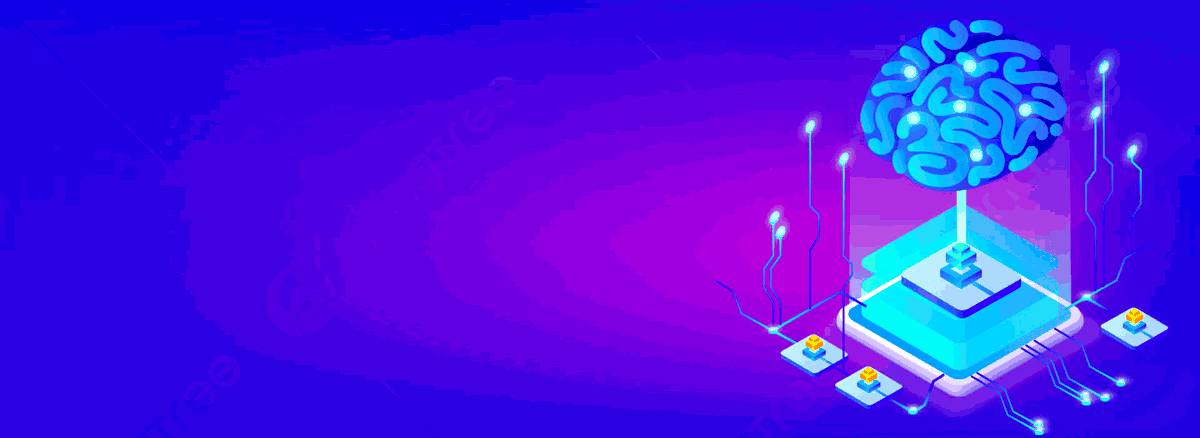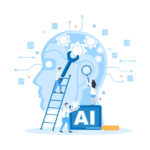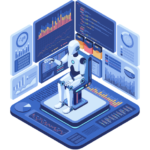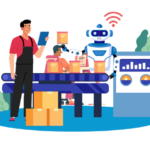AI tools for software development revolutionize efficiency, enabling seamless collaboration and accelerating project completion like never before.

Summary
Discover our comprehensive list of the best AI tools for software development that can improve your workflow, streamline processes, and help you create innovative products.
These AI-powered tools have the potential to revolutionize the way you develop software, automate repetitive tasks, and optimize overall efficiency.
In this article, you will learn:
- The top AI tools for various aspects of software development
- How AI can enhance your software development process
- Tools that can help you generate code, test, debug, and maintain your software
As a software developer, having the right tools at your disposal can make all the difference in terms of productivity, efficiency, and innovation. In recent years, AI has emerged as a game-changing technology in the software development landscape, offering developers the ability to harness its power to tackle complex tasks, automate mundane processes, and even generate code.
In this article, we have curated a list of the best AI tools for software development, covering various aspects such as code generation, testing, debugging, and maintenance.
These tools are designed to help you work smarter, faster, and more effectively. Let’s dive in and explore how AI can revolutionize your software development journey.
AI Tools for Software Development
1. Kite
Code faster with AI-powered autocompletion
Limitations: Free version has limited features
Kite is an AI-powered code completion tool that integrates with popular IDEs and text editors. It analyzes your code as you type and provides intelligent code completions, function signatures, and documentation to help you write code faster and more efficiently.
Features of the Kite AI tool:
| Feature | Description |
|---|---|
| Autocomplete plugin | Provides an autocomplete plugin for your favorite IDE |
| Desktop app | Provides a desktop app for searching for Python docs |
| Supports 13 languages | Supports 13 languages including Python, Java, C++, and JavaScript |
| Supports 16 editors/IDEs | Supports 16 editors/IDEs including Visual Studio Code, PyCharm, and Sublime Text |
| AI-powered coding assistant | Automates the repetitive parts of programming |
| Secure | Kite is secure and easy-to-use |
Alternatives: Tabnine, Codota
2. DeepCode
Automate code review with AI-driven insights
Limitations: Free for open-source projects and up to 30 private repositories
DeepCode is an AI-powered code review tool that analyzes your code and provides actionable insights to improve its quality. It detects security vulnerabilities, coding errors, and performance issues, offering real-time feedback and recommendations to help you write better code.
Features of DeepCode AI tool:
| Feature | Description |
|---|---|
| Semantic static code analysis | Provides semantic static code analysis for better software |
| Powered by AI | Powered by AI software platform that combines Big Code, cutting-edge program analysis methods and proprietary representation model |
| Code review tool | Analyzes your code and provides recommendations on how to improve it |
| Code completion | Offers code completion feature |
| Refactoring | Offers refactoring feature |
| Lining | Offers lining feature |
Alternatives: Codacy, SonarQube
3. OpenAI Codex
Generate code with AI language models
Limitations: Accessible through API, pricing varies
OpenAI Codex is a powerful AI language model designed for code generation. It can automatically generate code based on natural language descriptions, making it easier for developers to create new features, fix bugs, or refactor existing code.
Features Include
| Feature | Description |
|---|---|
| Most capable Programming Language | Most capable in Python, but proficient in over a dozen languages including JavaScript, Go, Perl, PHP, Ruby, Swift, C# and TypeScript |
| Memory | Has a memory of 14KB for Python code |
| Contextual information | Can take into account over 3x as much contextual information while performing any task |
| Code-davinci-002 model | Our most capable Codex model. It is particularly good at translating natural language to code |
| Code-cushman-001 model | Our second Codex model. It is particularly good at completing code and supports inserting completions within code |
Alternatives: GitHub Copilot (powered by OpenAI Codex)
4. Diffblue Cover
Automatically generate unit tests for Java code
Limitations: Free community edition has limited features
Diffblue Cover is an AI-powered tool that automatically generates unit tests for Java code. It uses machine learning to analyze your codebase and create tests that cover a wide range of scenarios, helping you ensure code quality and prevent regressions.
Alternatives: Randoop, EvoSuite
5. Applitools Eyes
Visual testing with AI-powered image comparison
Limitations: Free plan available with limited features
Applitools Eyes is an AI-driven visual testing tool that helps you ensure your application looks perfect across different devices and browsers. It uses AI-powered image comparison technology to detect visual differences between expected and actual output, making it easy to identify and fix UI issues.
Alternatives: Percy, Screener
6. ReTest
AI-powered regression testing with minimal effort
Limitations: Free trial available
ReTest is an AI-based regression testing tool that simplifies the process of creating and maintaining test cases. It uses machine learning to analyze your application and automatically generate tests, reducing the
manual effort required and ensuring comprehensive test coverage.
Alternatives: Testim, Functionize
7. Datree
Enforce best practices and coding standards with AI-powered code review
Limitations: Free for open-source projects, paid plans for private repositories
Datree is an AI-powered code review tool that helps you enforce best practices and coding standards across your development team. It integrates with your existing CI/CD pipeline and provides automated code analysis, suggesting improvements and flagging potential issues before they become a problem.
Alternatives: CodeScene, Embold
8. Botpress
Build intelligent chatbots with an open-source AI platform
Limitations: Free for developers, paid plans for businesses
Botpress is an open-source AI platform that allows you to build intelligent chatbots for various use cases, including customer support, sales, and internal tools. With its visual interface and powerful NLU engine, Botpress makes it easy to create and deploy AI-powered chatbots without extensive coding experience.
Alternatives: Rasa, Dialogflow
9. Mabl
Intelligent end-to-end test automation for web applications
Limitations: Free trial available, pricing varies
Mabl is an AI-driven test automation tool designed for web applications. It uses machine learning to create, execute, and maintain end-to-end tests, making it easier to ensure the functionality and performance of your application throughout its lifecycle.
Alternatives: TestCraft, Endtest
11. Prodo.AI
Automate project management with AI-powered predictions
Limitations: Early access, pricing varies
Prodo.AI is an AI-driven project management tool that helps you predict project timelines, resource allocation, and potential bottlenecks. By analyzing historical data and project status, Prodo.AI provides valuable insights to optimize your software development process and improve overall efficiency.
Alternatives: Forecast, ClickUp
12. Deep TabNine
Supercharge your code completion with AI
Limitations: Free version available, premium version offers more features
Deep TabNine is a code completion extension for popular IDEs and text editors that uses AI to provide context-aware suggestions. It analyzes your code in real-time and offers intelligent completions, helping you write code faster and more accurately.
Alternatives: Kite, Codota
13. O’Reilly AI-Powered Search
Find relevant resources and learning materials with AI-driven search
Limitations: Subscription-based access
O’Reilly AI-Powered Search is a search engine designed for developers, providing AI-driven search results to help you find relevant resources, learning materials, and code examples. With its advanced NLP capabilities, O’Reilly AI-Powered Search makes it easy to discover new insights and solutions to your software development challenges.
Alternatives: Google, Stack Overflow
14. Grammarly
Improve your code documentation with AI-powered writing assistant
Limitations: Free version available, premium version offers more features
Grammarly is an AI-powered writing assistant that can help you improve the quality of your code documentation, commit messages, and other written communications. It provides real-time grammar, spelling, and style suggestions, ensuring your written content is clear, concise, and professional.
*Alternatives: LanguageTool, ProWritingAid
15. AI Fairness 360 (AIF360)
Detect and mitigate bias in machine learning models
Limitations: Requires some understanding of machine learning concepts
AI Fairness 360 is an open-source library developed by IBM to help detect and mitigate bias in machine learning models throughout the AI application lifecycle. This tool is essential for ensuring fairness and eliminating potential biases in your software solutions.
Alternatives: Fairlearn, TensorFlow Fairness Indicators
17. DVC (Data Version Control)
Version control system for data and machine learning projects
Limitations: Steeper learning curve compared to traditional version control systems
DVC is an open-source version control system for managing your data and machine learning projects. It allows you to track the progress of your models, collaborate with team members, and ensure reproducibility in your data science workflow.
Alternatives: Pachyderm, Metaflow
19. Fossa
Automate open-source license compliance
Limitations: Free tier has limited features
Fossa is an AI-driven tool that helps developers automate open-source license compliance and dependency management. By scanning your codebase for license violations, Fossa ensures that your software development project adheres to legal and licensing requirements.
Alternatives: Black Duck, WhiteSource
21. Semantic Merge
AI-assisted code merging and conflict resolution
Limitations: Limited to specific programming languages
Semantic Merge is an AI-powered tool that simplifies the process of merging code changes and resolving conflicts. It understands the underlying structure of your code, allowing it to perform more accurate and efficient merges than traditional text-based merge tools.
Alternatives: KDiff3, Meld
22. Peltarion
AI platform for building, deploying, and managing deep learning models
Limitations: Limited features in the free tier
Peltarion is an AI platform designed for building, deploying, and managing deep learning models without extensive coding or machine learning expertise. With an intuitive interface and a wide range of pre-built components, Peltarion enables software developers to integrate AI capabilities into their projects quickly and easily.
Alternatives: H2O.ai, DataRobot
23. DataRobot
Automated machine learning platform
Limitations: Free tier has limited features and usage
DataRobot is an automated machine learning platform that enables developers to build, deploy, and manage machine learning models without extensive coding or machine learning expertise. With a wide range of pre-built models and an intuitive interface, DataRobot empowers developers to integrate AI capabilities into their software projects easily.
Alternatives: H2O.ai, Peltarion
24. ModelDB
Version control for machine learning models
Limitations: Requires some understanding of machine learning concepts
ModelDB is an open-source version control system specifically designed for machine learning models. It allows developers and data scientists to track, store, and manage their models efficiently, ensuring reproducibility and collaboration in AI-driven software projects.
Alternatives: DVC (Data Version Control), Neptune.ai
25. AI Dungeon
AI-powered text adventure platform for Data Scientists
Limitations: Requires a subscription for advanced features
AI Dungeon is an AI-powered text adventure platform that allows Data Scientists to create immersive, dynamic, and responsive narrative experiences. By leveraging advanced natural language processing techniques, AI Dungeon enables developers to build games with rich, engaging storylines that adapt to player input.
Alternatives: Promethean AI, Spirit AI
26. Snyk
Security vulnerability detection for open-source dependencies
Limitations: Free tier has limited features and usage
Snyk is an AI-driven tool that helps developers identify and fix security vulnerabilities in their open-source dependencies. By continuously monitoring your codebase and its dependencies, Snyk ensures that your software development project remains secure and up-to-date.
Alternatives: WhiteSource, Black Duck
27. SigOpt
AI-driven optimization platform
Limitations: Requires a paid subscription for full features
SigOpt is an AI-driven optimization platform that helps developers and data scientists fine-tune their machine learning models and algorithms. By leveraging advanced optimization techniques, SigOpt enables you to maximize the performance and efficiency of your AI-driven software projects.
Alternatives: Optuna, Hyperopt
How AI Enhances the Software Development Process
Now that we’ve explored the various AI tools available for software development, let’s dive into how these tools can enhance your development process and help you create better software.
- Automation: AI tools can automate repetitive tasks, such as code generation, testing, and bug detection, freeing up your time to focus on more critical aspects of your project.
- Efficiency: AI-powered tools can analyze large volumes of code quickly, providing real-time feedback and insights that can help you optimize your code, identify issues, and make improvements faster.
- Quality: AI tools can help you enforce coding standards and best practices, ensuring that your code is clean, secure, and maintainable.
- Collaboration: AI-powered tools can streamline the collaboration process among development teams by identifying potential conflicts, suggesting improvements, and helping you manage your project more effectively.
- Innovation: AI tools can generate code based on natural language descriptions or automatically create tests for your code, enabling you to explore new ideas and features more quickly and efficiently.
Problems and Solutions in AI Tools for Software Development
In this section, we will discuss some of the less common but crucial problems that developers might face when working with AI tools for software development, along with their potential solutions.
Problem 1: Lack of Explainability in AI Models
While AI models can provide powerful insights and predictions, they often act as “black boxes” that make it difficult to understand the reasoning behind their decisions. This lack of explainability can make it challenging to trust and validate the models’ output.
Solution:
Implementing explainable AI (XAI) techniques can help improve the transparency and interpretability of your AI models. Some popular XAI methods include LIME (Local Interpretable Model-agnostic Explanations), SHAP (SHapley Additive exPlanations), and counterfactual explanations.
By incorporating these techniques, you can better understand the rationale behind your models’ decisions and build trust in their output.
Problem 2: Overfitting and Underfitting in Machine Learning Models
Overfitting occurs when a machine learning model performs exceptionally well on the training data but poorly on unseen data, whereas underfitting happens when the model does not capture the underlying patterns in the data. Both overfitting and underfitting can result in suboptimal model performance.
Solution:
To prevent overfitting, consider using techniques like cross-validation, regularization, or reducing model complexity. To address underfitting, try increasing the model complexity, using more features, or obtaining more training data.
Problem 3: Imbalanced Datasets
Imbalanced datasets, where certain classes are underrepresented, can lead to biased AI models that favor the majority class. This can result in poor performance and fairness issues when deployed in real-world applications.
Solution:
To tackle the problem of imbalanced datasets, you can use techniques like oversampling the minority class, undersampling the majority class, or applying synthetic data generation methods like SMOTE (Synthetic Minority Over-sampling Technique). Alternatively, you can also adjust the model’s loss function to penalize misclassifications of the minority class more heavily.
Problem 4: High Latency in AI-Driven Applications
AI-driven applications often require real-time or near-real-time processing, which can be hindered by high latency in the AI models’ predictions.
Solution:
To reduce latency, consider optimizing the model’s architecture, leveraging model compression techniques, or using hardware accelerators such as GPUs, TPUs, or FPGAs. Additionally, deploying your AI models on edge devices or using distributed computing architectures can help minimize latency.
Problem 5: Integrating AI Tools into Existing Development Workflows
Integrating AI tools into existing development workflows can be challenging, as it requires collaboration between data scientists, developers, and other stakeholders.
Solution:
To facilitate smooth integration, adopt a collaborative approach and invest in tools that enable seamless collaboration between team members.
Consider using platforms like MLflow, Kubeflow, or DVC, which offer end-to-end machine learning lifecycle management and support version control, experiment tracking, and model deployment.
By addressing these uncommon problems and implementing their respective solutions, you can ensure that your AI-driven software development projects remain robust, efficient, and effective.
Conclusion
The integration of AI tools into the software development process has the potential to revolutionize the way developers work, offering increased efficiency, automation, and overall improvements in code quality. By leveraging the power of AI, you can streamline your development process, enhance collaboration, and create innovative software products that stand out in the market.
To make the most of these cutting-edge AI tools, it’s essential to stay up-to-date with the latest advancements in the field and continuously evaluate your toolset to ensure you’re using the most effective solutions for your specific needs.
With the right AI tools at your disposal, you’ll be well-equipped to tackle the challenges of modern software development and stay ahead of the competition.
Further Resources
Now you’ve learned about AI tools for software development and how they can enhance your development process, you may be interested in exploring related topics to deepen your understanding and expand your skillset.
Here are a few suggested articles to read in the series:
- AI and Machine Learning Libraries for Software Developers: An in-depth exploration of popular AI and machine learning libraries, such as TensorFlow, PyTorch, and Scikit-learn, and how to integrate them into your software projects.
- Improving Code Quality with AI-powered Linters and Formatters: A comprehensive guide to AI-powered linters and formatters that can help you maintain a consistent coding style, improve code readability, and adhere to best practices.
- Automating Software Testing with AI: A detailed overview of AI tools and techniques for automating software testing, including test generation, test execution, and result analysis.
- Optimizing Software Performance using AI: A deep dive into how AI can help identify performance bottlenecks, optimize code for faster execution, and ensure your software is scalable and efficient.
- Leveraging Natural Language Processing in Software Development: An examination of how NLP techniques can be used to improve the software development process, from generating code based on natural language descriptions to extracting insights from user feedback.
Jane Watson is a seasoned expert in AI development and a prominent author for the “Hire AI Developer” blog. With over a decade of experience in the field, Jane has established herself as a leading authority in AI app and website development, as well as AI backend integrations. Her expertise extends to managing dedicated development teams, including AI developers, Machine Learning (ML) specialists, and other supporting roles such as QA and product managers. Jane’s primary focus is on providing professional and experienced English-speaking AI developers to companies in the USA, Canada, and the UK.
Jane’s journey with AI began during her time at Duke University, where she pursued her studies in computer science. Her passion for AI grew exponentially as she delved into the intricacies of the subject. Over the years, she honed her skills and gained invaluable experience working with renowned companies such as Activision and the NSA. These experiences allowed her to master the art of integrating existing systems with AI APIs, solidifying her reputation as a versatile and resourceful AI professional.
Currently residing in the vibrant city of Los Angeles, Jane finds solace in her role as an author and developer. Outside of her professional pursuits, she cherishes the time spent with her two daughters, exploring the beautiful hills surrounding the city. Jane’s dedication to the advancement of AI technology, combined with her wealth of knowledge and experience, makes her an invaluable asset to the “Hire AI Developer” team and a trusted resource for readers seeking insights into the world of AI.







